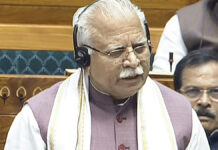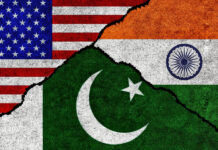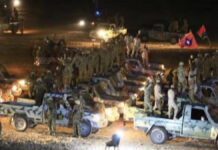The recent martyrdom of five valiant army personnel in a terrorist attack in the Poonch district is not just a tragic loss for the nation but a stark reminder of the persistent shadow of cross-border terrorism. The incident, which also left two others injured, painfully underscores the ongoing challenges India faces in securing its borders and maintaining peace in the region. The resurgence of terrorist activities in the Rajouri-Poonch sector is deeply concerning. Reports suggest that 25-30 Pakistani terrorists are suspected to be hiding in the forest areas, plotting further attacks. This revelation is not just alarming but indicative of a more sinister agenda at play, orchestrated by Pakistan with the tacit support of China. The intent, it seems, is clear: to revive terrorism in these strategic areas as part of a larger game plan to destabilize the region. The Pakistan-China nexus aims to stretch the Indian Army’s resources thin, compelling a redeployment of forces from the critical Ladakh sector, where Indian and Chinese forces have been in a standoff for the past three years. This strategy, if successful, would force India to divert attention and resources from the Ladakh frontier, thereby weakening its position against China’s PLA. Such tactics are not new. They are part of a continued strategy of proxy warfare, where terrorist groups are used as pawns in a larger geopolitical chess game. The martyrdom of our soldiers in Poonch is a tragic outcome of this long-standing policy of nurturing and exporting terror. India’s response to this challenge needs to be multi-dimensional. While the immediate focus is on neutralizing the terrorist threat in the region, there is a pressing need for a more robust, long-term strategy. This involves not just military vigilance but also diplomatic efforts to expose and counter the nefarious designs of the Pakistan-China alliance on international platforms. Moreover, there is an urgent requirement to strengthen intelligence and surveillance mechanisms to pre-empt such attacks. The use of advanced technology and better coordination between various security agencies can play a critical role in this regard. In parallel, India must continue to push for peaceful, diplomatic resolutions to its border disputes, while remaining firm in its stance against aggression. The sacrifice of our soldiers in Poonch is a somber reminder of the price paid for peace and security. It is a price too high and one that demands a concerted, strategic response to ensure that such losses do not become a recurring tragedy. As we mourn the loss of our bravehearts, their martyrdom must reinforce our resolve to stand united against the forces of terror and aggression. It is a battle that must be fought on multiple fronts – military, diplomatic, and ideological. India’s commitment to peace and security, both within its borders and in the larger South Asian region, must remain unwavering in the face of such challenges.

Dogra Herald is the media of J & K, breaking language and geographical barriers, connecting J & K to the rest of India.
0191 245 4946
info@dograherald.com
Latest articles
Inspector Masroor’s killing to be investigated by NIA: Officer
DOGRA HERALD BUREAUSRINAGAR, Dec 8The probe into the killing of Jammu and Kashmir Police inspector Masroor Ahmad Wani has been handed over...
Google to invest Rs 75,000 crore in India over next 5-7 years: CEO Pichai
iamjkstarr - 0
Google CEO Sundar Pichai on Monday announced an investment of Rs 75,000 crore in India over the next 5-7 years through ''Google for India Digitisation...
NCC Unit of Dogra Degree College organizes Motivational Lecture on Defence Forces
DH NEWS SERVICEBari Brahmana, Apr 1NCC Unit of Dogra Degree College, in collaboration with Army Recruiting Office (ARO) Amphalla, Jammu successfully organized...

























